SASKATOON — The University of Saskatchewan says it is introducing a new policy that leaves verifying Indigenous identity up to those communities and their governments.
The policy is to apply when somebody seeks a position or scholarship that is being held for an Indigenous person.
The university will require people to present documentation to support their identity, said Peter Stoicheff, president and vice-chancellor at the university.
The university does not intend to determine who is Indigenous or not, he said, but instead be guided by Indigenous communities and their governments who are to provide the documentation.
Stoicheff said the documentation can look different depending on which community an Indigenous person identifies with.
"The university has not had a policy regarding Indigenous verification in the past," Stoicheff said Monday in Saskatoon. "It's had a practice ... of self-relying on self-verification and we've been very public about the fact that we have to move beyond that."
Last month, former health professor Carrie Bourassa resigned from the University of Saskatchewan after questions arose about her Indigenous identity.Â
In November, following a CBC report, the school placed Bourassa on leave and suspended her duties as a professor in the College of Medicine as they launched an investigation into her claims of being Métis.
Following her resignation, the university shifted its focus around its new policy, but the work had began much earlier, said Airini, the University of Saskatchewan's provost and vice-president academic.
"We had started this work in 2021, and we were progressing steadily with this. We did accelerate the pace of the policy development when we did have a case arise within the university," Airini said.
"We were on track already, and then we understood the imperative to actually take that step ... beyond self-identification and commit as a university to a verification of documentation process."
Other universities across Canada have also committed to enhancing policy around Indigenous identification including the University of Manitoba and Queen's University in Ontario.
The University of Saskatchewan said its policy will be fully implemented within two to five years.
Next month, the university will put together a task force that will work with Indigenous communities to discuss documentation.
"I think that the outcome will be confidence on the part of all members of our community, Indigenous and non-Indigenous, that those positions intended for Indigenous Peoples are held by Indigenous Peoples," Stoicheff said.
"There is no way we could have done this without the really intense and time-consuming participation of many Indigenous leaders: elders, knowledge keepers, language keepers, chiefs, presidents."
Métis Nation–Saskatchewan has already signed an agreement with the University of Saskatchewan to support and approve verification.
"With our Indigenous Elders guiding the work, the task force has come up with a positive solution to Indigenous verification," said MN–S President Glen McCallum in a statement.
The policy was also supported by the Saskatoon Tribal Council.
“Under Treaty and Inherent Rights, First Nations are the traditional rights holders of their citizenship and sovereignty," Saskatoon Tribal Council Chief Mark Arcand said in a statement. "This will enable accountability for those entering positions meant for Indigenous peoples."
This report by The Canadian Press was first published July 25, 2022.Â
Mickey Djuric, The Canadian Press


.png;w=120;h=80;mode=crop)

